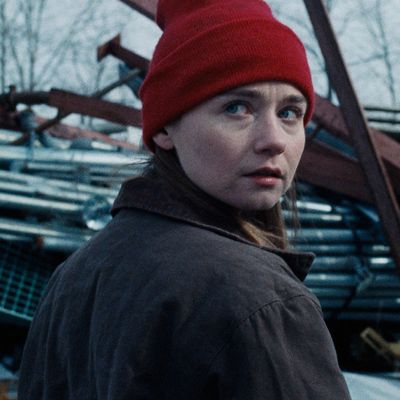
Nicole Riegel’s blue-collar drama Holler (out now in select theaters and on demand) is the kind of film that might at first glance feel all too familiar but upon closer examination reveals uncommon artistry and depth. The festival landscape used to be littered with movies like this — downtrodden men and women trying (and often failing) to get by in grim, dead-end settings — at least until indie filmmakers realized their low-budget efforts were better directed toward show-offy calling cards for helming future studio products, franchise and otherwise. In that sense, Holler feels like both a throwback and an elevation. I saw my share of movies like this in the late 1990s and early 2000s, but they were rarely this captivating.
Making her directorial debut, Riegel plunges us into the lives of her struggling characters and their dismal world, but she avoids wallowing in miserabilist tedium. That’s quite an achievement given that even a cursory description of the story would suggest otherwise. The film opens on teenage Ruth (Jessica Barden) in mid-sprint as she steals some bags of cans, which she and her older brother Blaze (Gus Harper) then sell to a local scrap-metal dealer, Hark (Austin Amelio). The two siblings are currently on their own, since their addict mom (Pamela Adlon) is stuck in the local jail and refuses to enter rehab. (One wall of the jail is emblazoned with the words “Follow God, Love Others, Share Jesus,” which I assume was not something the filmmakers created but an actual message on an actual wall somewhere, possibly in an actual jail.) Eviction notices are showing up, and the water at their home has been turned off. Their situation is so desperate that for some extra rations the kids regularly visit the local food-processing plant where their mom used to work and where her closest friend Linda (Becky Ann Baker) slips them extra meals.
A pathetic but promising reprieve comes when Hark offers Ruth and Blaze a job working on his crew, breaking into abandoned factories and warehouses at night and stripping the walls, shelves, and conduits of any scrap metal, which Hark then sells abroad. “You ever looked around this town?” Hark asks. “Manufacturing drying up left and right, leaving behind whole buildings that are just rotting away. We scrap the metal and we sell to China, straight from the yard. I’m talking modern-day gold mines.” He’s not wrong: For anyone willing to brave getting caught or getting hurt, this Ohio Rust Belt ghost town is just sitting there waiting to be plundered of its not-so-natural resources.
Riegel presents this drab, cold-blue landscape of steel and concrete with poetic clarity. You can feel the characters’ breath condensing in the air, the grit and grime of their labor, which at times feels like a rebuke to the post-human terrain around them. The measure of a director often lies in their ability to surprise us with the familiar, and even though there’s nothing particularly remarkable in the bare facts of Riegel’s setting, she makes it all so cruelly breathtaking, finding an otherworldly foreboding in the heaps of trash and metal that surround Hark’s scrapyard and a dark impermanence in the spaces our protagonists wander through. At the processing plant, we see the machines churning away before we see any humans: sad strands of spaghetti sliding down industrial sluices, food packages spiraling along unmanned conveyor belts. (Holler was shot on 16mm film by cinematographer Dustin Lane, and that extra bit of grain adds untold texture to what we see onscreen.) Over and over, cinematic style conveys the sad truth that the people in this place are afterthoughts, or even worse, disposable — a fact confirmed by two very different developments late in the film.
There’s a forbidding beauty to Holler, too. After Ruth’s first successful stint cutting up an old building for sheet metal and precious copper wire, Riegel lets us briefly bask in her triumph: The girl sits in the back of a truck, looking up at the night sky, the traffic lights dancing on her face like the glow of celebratory fireworks. Of course, since this is a movie, nothing will ultimately go as planned; the next time we see Ruth sitting in the back of that truck, she won’t be looking at the sky, and the light on her face will be harsh, cold, dead.
As Ruth, the precocious and industrious teen forced to grow up too fast and torn between a chance at a better life and the only world she’s ever known, Jessica Barden (who I was shocked to discover is 28 and British) at times recalls the young Jennifer Lawrence in Debra Granik’s Winter’s Bone. Austin Amelio, meanwhile, strikes a complex balance as the alternately sinister and chummy Hark — somewhere between Fagin-like junkyard mogul and a man who himself is just trying to get by. Grizzled and angular, he’s a gangster in training, but there’s also a weird little spark between him and Ruth; they’re drawn, it seems, to each other’s confidence, a rare quality in this dying place.
I realize I’m making the film sound too bleak and downcast. In truth, it’s almost impossible to be too depressed by a movie this immersive. Getting sucked into these people’s lives means experiencing the story in all its immediacy, sans judgment. Holler is too entertaining and well-made to be overly dour, too full of suspense and throwaway bits of cinematic elegance. It marks the arrival of a major new directorial talent.


